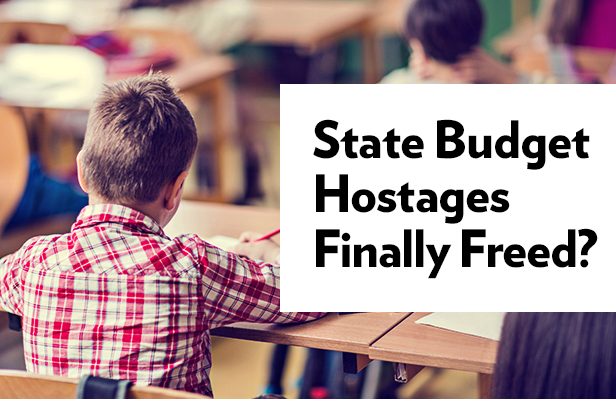Commentary

Budget Hostages Finally Freed?
Last week, public school students—or, at least, their parents—breathed a sigh of relief as Governor Wolf finally released state education funds withheld during the six-month budget impasse. Announcing the move, Wolf confessed that students had essentially been held for ransom, saying, “We're now at a point where I don't want to hold the children of Pennsylvania hostage.”
This shocking admission takes on Machiavellian status when you consider Wolf has long been the one holding the keys. In fact, Wolf touched off the budget crisis six months ago by vetoing the entire state budget—a drastic measure unheard of in the last 40 years—rather than vetoing only the parts he opposed.
In September, he rejected another chance to release the budget hostages, vetoing a partial, emergency budget. Why? In his words, he “want[ed] to keep the pressure up.”
Finally, months later, he tired of holding schoolchildren captive.
Better late than never.
Now we can move to a discussion of priorities without threats hanging over our children’s heads—or, can we?
While Wolf released the hostages of the past six months, he made sure he could keep using children as “pressure points” by using his line-item veto to cut $3.1 billion in education funding. Clearly, he’s willing to free schoolchildren now, but only if he can put schools on the hook for potential closings down the road if the vetoed funding isn’t restored soon.
What’s more, Wolf is propagating the bold-faced lie that the budget cuts education by $95 million.
In truth, the budget increases public school funding by $400 million. The only education line item reduced is school construction reimbursement. This is not being cut, however. Instead, it’s being funded with state bonds, and school districts will actually get more in construction reimbursements.
In fact, this was Wolf’s idea. It was included in the “framework budget” he previously agreed to, as can be seen on Wolf's own spreadsheet.
Unfortunately, distortion is just one of Wolf’s tactics. He’s also resorted to playground name-calling by labeling the budget “garbage” and an “exercise in stupidity.” This is unlikely to win goodwill among the very people the governor is supposed to be negotiating with.
Couple this campaign-style rhetoric with $500,000 in political attacks funded by government unions, and the outcome can only hinder budget compromise.
What’s Wolf’s ransom for all this political posturing? Higher taxes.
Four times he’s tried—and failed—to raise taxes on working families. His original tax proposal of $12 billion over two years (a net increase of $1,400 per family of four) won exactly zero votes among both parties. His modified version of that plan (a net increase of $1,000 per family of four) and his proposal to raise the sales tax to 7.5 percent, the second highest rate in the country, also fell flat. The most recent proposal he actually put into writing —centered on raising the income tax—failed on the House floor with overwhelming bipartisan opposition.
Tax hikes may not be part of Wolf’s stump speeches, but actions trump rhetoric. By vetoing parts of a budget with record-highs in education funding and total spending only to demand even more spending, Wolf is shouting his demand for a massive, broad-based tax increase.
Clearly, Wolf is ignoring reality: Lawmakers and taxpayers don’t want higher taxes—and well they shouldn’t.
The commonwealth’s state and local tax burden is already $4,374 per person, or a whopping $17,000 per family of four, according to the Tax Foundation—the 10th-highest in the nation.
Before taking more from working families, the governor and lawmakers must control spending. Step one should be eliminating corporate welfare. Tax dollars should not subsidize horse racing prizes, underwrite Hollywood movies, prop up alternative energy companies, fund corporate headquarters, or build sports stadiums.
Gov. Wolf has shown he’s adept at insults and distortion, but this has gotten us nowhere. His New Year’s resolution should be to work with lawmakers on real solutions that protect families from burdensome tax hikes.
# # #
Nathan A. Benefield is vice president of policy analysis for the Commonwealth Foundation (CommonwealthFoundation.org), Pennsylvania’s free market think tank.